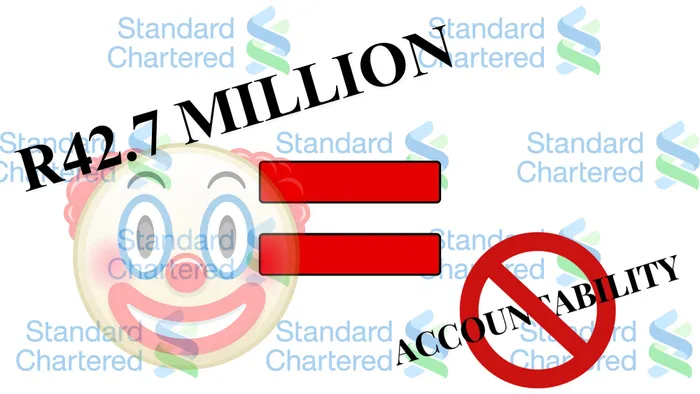Standard Chartered Bank must be held accountable for South Africans’ declining quality of life, and R42.7 million won't do

By Palesa Nungu
Everyone in South Africa has been going through the pain of navigating supermarket aisles in search of basic items to feed their families and loved ones.
But the rising costs of basic goods have made it almost impossible for the average person to keep up a decent standard of living. Inflation has been hitting the country hard for the past few years, leaving many people wondering what's going on.
The revelation lies within the current affairs, where Standard Chartered Bank has admitted to manipulating currency trading in South Africa, agreeing to a penalty payment of R42.7 million. The bank's admission of guilt regarding currency manipulation dates back to 2019.
This confession serves as one of the major contributing factors to the persistent inflation rates in South Africa, and yet the consequence appears to be a mere slap on the wrist – a R42.7 million penalty.
This sum, in light of the suffering endured by South African citizens, seems nothing short of a mockery.
Changing the value of money has effects that go far beyond numbers. This practice has had a big effect on South Africa's economy, especially since the country relies so much on goods from other countries. Changing the value of currencies has a direct effect on the prices of imported goods in local markets. Because a lot of the goods in South African stores are imported, changes in the value of the rand have a big effect on their prices.
When this happens, the value of the currency goes down or up, which has a direct effect on the prices of goods that are brought in from other countries. Consequently, South African consumers bear the weight of these fluctuations, encountering erratic and often inflated prices for everyday essentials. Whether it's electronics or basic necessities, imported products become more expensive when the local currency weakens against others.
This severely hampers consumers' purchasing power, making it increasingly challenging for them to afford essential items. Additionally, industries relying on imported raw materials face escalated production costs, jeopardising their competitiveness both domestically and internationally.
The bad effects aren't just happening to consumer goods; South Africa's exports are also having trouble. A weaker local currency might make exports cheaper for people in other countries (foreign countries), but it also makes it more expensive to bring in the materials that are needed to make things in South Africa. This rise in production costs can cancel out any supposed benefits of exporting, making it less profitable for local companies that trade internationally.
Standard Chartered Bank's involvement in these manipulative practices has substantially contributed to the struggles faced by South African businesses. This is corruption at its finest. Their actions have resulted in a mere R42.7 million penalty, yet if businesses have suffered or closed over recent years, Standard Chartered Bank shoulders a significant portion of the blame.
The manipulation of currency values fostered an unstable economic climate, burdening consumers with inflated prices while businesses grappled with unpredictable costs.
Addressing this issue now becomes imperative not only to stabilise prices but also to cultivate an environment conducive to sustainable economic growth in South Africa.
Someone needs to be held accountable
Despite preaching about sustainable economic growth, Standard Chartered Bank's actions do not align with their words. Banks continue to oppress citizens without truly facing the consequences of their actions. While banks avoid consequences, South Africans endure the impact of their misconduct. This leads to the question of why are the banks above the law?
Why are they silent?
The sum of R42.7 million fails to reflect fairness and justice. For justice to prevail among South Africans, it is imperative to hold Standard Chartered Bank accountable.
Financial regulatory authorities like the South African Reserve Bank (SARB) and the Financial Sector Conduct Authority (FSCA), alongside competition authorities, law enforcement agencies, legal avenues for affected parties, international regulatory bodies, bank executives and employees, and government oversight bodies must vigorously investigate and enforce suitable penalties against those involved in this financial misconduct.
The question arises: Are we all complicit in a grand scheme to dismantle the South African economy? Accountability is not an option but a necessity to safeguard the integrity and well-being of our nation and South Africa is in need of a competent and committed justice system.
* The views expressed do not necessarily reflect the views of IOL or Independent Media.